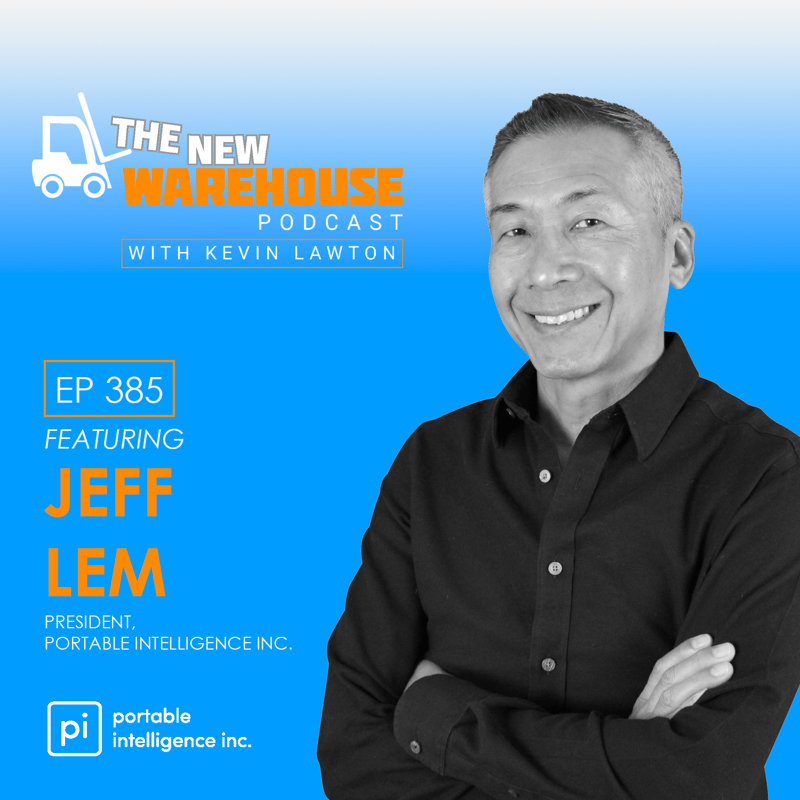
Episode 385: Portable Intelligence’s Smart Warehouse Platform
In this episode of The New Warehouse Podcast, Kevin welcomes Jeff Lem, President and Founder of Portable Intelligence, to discuss the next generation of warehouse management systems and his book, now in its second edition, Your Warehouse is Not Your Fridge. Portable Intelligence is working on smart warehouse solutions incorporating artificial intelligence (AI) and real-time locating systems (RTLS) for indoor tracking. By pushing the boundaries and challenging the manual processes in traditional WMS systems, Portable Intelligence is creating a new frontier in warehouse management.
Automating Prioritization and Task Allocation in a Smart Warehouse Platform
Smart warehouses like Portable Intelligence’s platform aim to hold workers accountable and distribute tasks based on priorities, contributing to efficiency improvements. Lem explains how the Task Engine Distributor (TED) from Portable Intelligence assigns tasks to the most available worker using AI and RTLS, improving warehouse efficiency and reducing travel time by 25%. He adds, “Despite the implementation of barcoding, wifi, and other wireless technologies, many processes in the industry still rely heavily on manual methods and require a considerable amount of tribal knowledge.”
Standardizing processes and monitoring production lines can lead to better conversations around efficiency and best practices. One successful example was assigning a pool of workers to a zone, offering flexibility in defining the size of the zone, which led to more consistency in service and eliminated the need for drive-bys. Tasks are now monitored, and start and stop times and distance traveled are tracked, leading to efficient discussions and improvements in the workplace.
Leveraging Data and Analytics of a Smart Warehouse Platform Can Improve Warehouse Safety
Portable Intelligence’s Smart Warehouse platform provides real-time maps and analytics that improve the safety and analysis of tasks. Installing a real-time map and heat map allows management to track worker locations, specific tasks, and safety incidents. According to Lem, “From a safety perspective as well, now I’ll have a history of that if there is an accident. In a certain area, they can always do what we call playback and review all the traffic that occurred in that area where the traffic, where the accident may have happened, where the accident had happened.”The system has been successful, and ideas for new features are coming from the workers.
What’s new in the 2nd Edition of “Your Warehouse is Not Your Fridge.”
Lem recognized that the world changed dramatically over a very short period of time since his book, Your Warehouse is Not Your Fridge, was published in 2019. With the pandemic and supply chain disruptions, it became apparent that warehouses needed to improve their processes. In the second edition of his book, Jeff highlights the need for accurate inventories and the challenges of dealing with limited space and workers.
The book also emphasizes advancing warehouse technology beyond barcoding and wireless systems. Lem mentions Zebra’s warehouse maturation process, which outlines the five stages of warehouse growth. Most companies can only achieve stage three, which involves a typical WMS with a barcoding and wireless system. However, he encourages companies to challenge themselves to reach stage four and beyond with task management and AI integration.
As automation becomes more prevalent in warehouses, it is crucial to synchronize and orchestrate the work of humans and machines. Jeff also points out that there has been an increase in inventory due to recent shortages. Companies must manage their inventory effectively by utilizing basic inventory principles such as inventory turns and ensuring that products do not become stale.
Key Takeaways
- Warehouses often rely on rules of thumb and tribal knowledge, with little accountability.
- Smart warehouses improve efficiency by holding workers accountable and distributing tasks based on priorities.
- Deploying a task engine distributor like Ted can improve warehouse operations by automating prioritization, providing real-time tracking and analysis, and enabling continuous improvement.
EP 385: Portable Intelligence’s Smart Warehouse Platform









